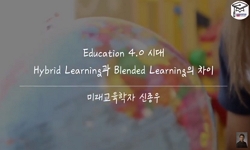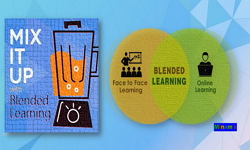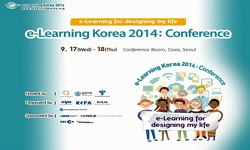This study aims to investigate the effects of blended learning on Thai university students’ speaking ability, students’ learning motivation, as well as to explore students’ and teachers’ perceptions towards blended learning. Utilizing a mixed-...
http://chineseinput.net/에서 pinyin(병음)방식으로 중국어를 변환할 수 있습니다.
변환된 중국어를 복사하여 사용하시면 됩니다.
- 中文 을 입력하시려면 zhongwen을 입력하시고 space를누르시면됩니다.
- 北京 을 입력하시려면 beijing을 입력하시고 space를 누르시면 됩니다.


The Effects of Blended Learning on Thai University Students’ Speaking Ability, Learning Motivation and Perceptions
한글로보기https://www.riss.kr/link?id=A107252008
-
저자
Piyapan Kantisa (Language Institute, Thammasat University, Thailand) ; Pragasit Sitthitikul (Language Institute, Thammasat University, Thailand)

- 발행기관
- 학술지명
- 권호사항
-
발행연도
2020
-
작성언어
English
- 주제어
-
등재정보
KCI등재,SCOPUS,ESCI
-
자료형태
학술저널
-
수록면
1377-1391(15쪽)
-
KCI 피인용횟수
0
- 제공처
-
0
상세조회 -
0
다운로드
부가정보
다국어 초록 (Multilingual Abstract)
This study aims to investigate the effects of blended learning on Thai university students’ speaking ability, students’ learning motivation, as well as to explore students’ and teachers’ perceptions towards blended learning. Utilizing a mixed-methods embedded experimental research design, 56 students in the treatment group received blended learning instruction. Meanwhile, the other 46 students in the control group received traditional teaching instruction. In this study, the pre- and post-speaking tests and students’ learning motivation questionnaires were used to collect the quantitative data. The qualitative data were retrieved from students’ online reflection blogs and students’ and teachers’ semi-structured group interviews. Both descriptive and inferential statistical methods were then used to analyze the data. The research results revealed that blended learning instruction helped improve students’ speaking ability. Furthermore, the results indicated that students’ learning motivation was at a high level. Additionally, a great majority of both student and teacher participants had positive perceptions towards blended learning. The research results, therefore, conclusively proves that blended learning implementation is effective in improving students’ speaking ability and in attaining a high level of students’ learning motivation.
목차 (Table of Contents)
- Abstract
- Introduction
- Literature Review
- Blended Learning
- Speaking Ability
- Abstract
- Introduction
- Literature Review
- Blended Learning
- Speaking Ability
- Learning Motivation
- Related Research Studies
- Methodology
- Research Design
- Research Context
- Participants
- Research Instrument
- Instructional Instrument
- Data Collection Procedures
- Results
- Learning Experiences and Teaching Management
- Availability of Technology and Facilities Required
- Teachers’ and Students’ Readiness
- Success Factors
- Discussion
- Students’ Speaking Ability
- Students’ Learning Motivation
- Students’ and Teachers’ Perceptions
- Conclusion
- The Authors
- References
참고문헌 (Reference)
1 Khan, B., "Web-based Instruction" Educational Technology Publications 1997
2 Capo, B. H., "Web 2.0 technologies for classroom instruction: High school teachers’ perceptions and adoption factors" 12 (12): 235-253, 2011
3 Bataineh, R., "The utility of blended learning in EFL reading and grammar: A case for moodle" 17 (17): 35-49, 2017
4 Maulan, S., "The teaching and learning of English for academic purposes in blended environment" 67 : 561-570, 2012
5 Tosun, S., "The effects of blended learning on EFL students’ vocabulary enhancement" 199 : 641-647, 2015
6 Elahe Ehsanifard, "The Impact of Blended Learning on Speaking Ability and Engagement" 아시아테플 17 (17): 253-260, 2020
7 Maesincee, S., "Thailand 4.0: Thriving in the 21st century through security, prosperity & sustainability"
8 Hughes, A., "Testing for language teachers" Cambridge University Press 2013
9 Malissa Maria Mahmud, "Technology and Language – What Works and What Does Not: A Meta-analysis of Blended Learning Research" 아시아테플 15 (15): 365-382, 2018
10 Brown, H. D., "Teaching by principles: An interactive approach to language pedagogy" Prentice Hall 1994
1 Khan, B., "Web-based Instruction" Educational Technology Publications 1997
2 Capo, B. H., "Web 2.0 technologies for classroom instruction: High school teachers’ perceptions and adoption factors" 12 (12): 235-253, 2011
3 Bataineh, R., "The utility of blended learning in EFL reading and grammar: A case for moodle" 17 (17): 35-49, 2017
4 Maulan, S., "The teaching and learning of English for academic purposes in blended environment" 67 : 561-570, 2012
5 Tosun, S., "The effects of blended learning on EFL students’ vocabulary enhancement" 199 : 641-647, 2015
6 Elahe Ehsanifard, "The Impact of Blended Learning on Speaking Ability and Engagement" 아시아테플 17 (17): 253-260, 2020
7 Maesincee, S., "Thailand 4.0: Thriving in the 21st century through security, prosperity & sustainability"
8 Hughes, A., "Testing for language teachers" Cambridge University Press 2013
9 Malissa Maria Mahmud, "Technology and Language – What Works and What Does Not: A Meta-analysis of Blended Learning Research" 아시아테플 15 (15): 365-382, 2018
10 Brown, H. D., "Teaching by principles: An interactive approach to language pedagogy" Prentice Hall 1994
11 Brown, H. D., "Teaching by principles: An interactive approach to language pedagogy" Addison Wesley Longman Inc 2001
12 Tamim, R. M., "Teachers’ use of YouTube in the United Arab Emirates: An exploratory study" 30 (30): 329-345, 2013
13 Soler, R., "Subjects in the blended learning model design: Theoretical and methodological elements" 237 : 771-777, 2017
14 Cohen, A. D., "Strategies in learning and using a second language" Addison Wesley Longman Inc 1998
15 Gardner, R. C., "Social psychology and second language learning: The role of attitudes and motivation" Edward Arnold Publisher 1985
16 Dornyei, Z., "Research methods in applied linguistics" Oxford University Press 2007
17 Lichtman, M., "Qualitative research in education" Sage Publication 2013
18 Yusica, U., "Problems faced by Thai students in speaking English"
19 Bailey, K. M., "Practical English language teaching" McGraw-Hill Education 2005
20 Rovinelli, R. J., "On the use of content specialists in the assessment of criterion- referenced test item validity" 2 : 49-60, 1977
21 Kachru, B., "Multilingualism and multiculturalism" 1 : 182-186, 1992
22 Crookes, G., "Motivation: Reopen the research agenda" 41 : 469-512, 1991
23 Budi Waluyo, "Learning Outcomes of a General English Course Implementing Multiple E-learning Technologies and Active Learning Concepts" 아시아테플 17 (17): 160-181, 2020
24 Blumer, H., "Industrialization as an agent of social change: A critical analysis" Aldine de Gruyter 1990
25 Creswell, W. J., "Handbook of mixed methods in social and behavioral research" Sage Publications 2003
26 Block, D., "Globalization and language teaching" Routledge 2002
27 Hubackova, S., "Evaluation of blended learning" 217 : 551-557, 2016
28 Stein, J., "Essentials for blended learning" Routledge 2014
29 Noom-ura, S., "English teaching problems in Thailand and Thai teachers’ professional development needs" 6 (6): 139-147, 2014
30 Horn, M. B., "Blended: Using disruptive innovation to improve schools" Jossey-Bass 2015
31 Allan, B., "Blended learning: Tools for teaching and training" Facet Publishing 2007
32 Kintu, M., "Blended learning effectiveness: The relationship between student characteristics, design features and outcomes" 14 (14): 1-20, 2017
33 Lana Hiasat, "Blended and Experiential Learning for Emiratis in Tertiary Education" 아시아테플 15 (15): 874-881, 2018
34 Kosar, G., "A study of EFL instructors’ perceptions of blended learning" 232 : 736-744, 2016
35 Ur, P., "A course in language teaching" Cambridge University Press 1998
동일학술지(권/호) 다른 논문
-
- 아시아영어교육학회
- Diah Royani Meisani
- 2020
- KCI등재,SCOPUS,ESCI
-
- 아시아영어교육학회
- Sedigheh Karimpour
- 2020
- KCI등재,SCOPUS,ESCI
-
Revisiting Teacher-based Assessment to Enhance EFL Teachers’ Assessment Literacy in South Korea
- 아시아영어교육학회
- Hoe Kyeung Kim
- 2020
- KCI등재,SCOPUS,ESCI
-
Washback of the College English Test – Band Four on English Teaching and Learning in China
- 아시아영어교육학회
- Linlin Wang
- 2020
- KCI등재,SCOPUS,ESCI
분석정보
인용정보 인용지수 설명보기
학술지 이력
| 연월일 | 이력구분 | 이력상세 | 등재구분 |
|---|---|---|---|
| 2023 | 평가예정 | 해외DB학술지평가 신청대상 (해외등재 학술지 평가) | |
| 2020-01-01 | 평가 | 등재학술지 유지 (해외등재 학술지 평가) |  |
| 2018-03-29 | 학회명변경 | 한글명 : 아시아영어교육학회 -> 아시아테플영문명 : The Asian Association Of Teachers Of English As A Foreign Language (Asia Tefl) -> AsiaTEFL (The Asian Association of Teachers of English As a Foreign Language) |  |
| 2013-10-01 | 평가 | 등재학술지 선정 (기타) |  |
| 2010-01-01 | 평가 | SCOPUS 등재 (신규평가) |  |
학술지 인용정보
| 기준연도 | WOS-KCI 통합IF(2년) | KCIF(2년) | KCIF(3년) |
|---|---|---|---|
| 2016 | 0 | 0 | 0 |
| KCIF(4년) | KCIF(5년) | 중심성지수(3년) | 즉시성지수 |
| 0 | 0 | 0 | 0 |




 KCI
KCI eArticle
eArticle






